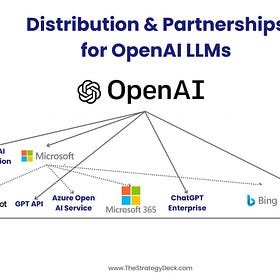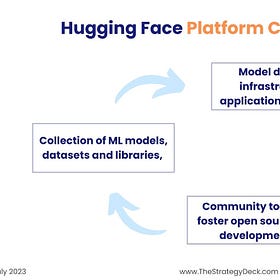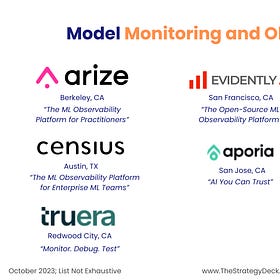The Strategy Deck Article Highlights from 2023
Machine Learning Foundation Models and Dev Tools, AI Applications and Strategy Building Frameworks
Happy New Year!
In 2023, on The Strategy Deck newsletter, I shared a variety of perspectives and analysis of the Machine Learning and Gen AI value chain, created a considerable amount of market maps - updated them, too, because the sector has been growing fast and wide - and highlighted the product strategy of major tech companies and AI start-ups.
The intent behind The Strategy Deck newsletter is to:
Track the directions of growth and measure the impact in the market of technology products and services
Showcase the business and product strategy of established tech companies, as well as start-ups
Provide frameworks and best practices into how to develop unique and compelling business strategy, product differentiation and competitive advantage
I put below a list of the articles from 2023 that represent in the best way the intentions above and that include AI market insights that continue to be helpful as we start 2024.
This year, on The Strategy Deck, I plan to:
Publish even more analysis and perspectives of developments in the tech world, with particular, but not exclusive, focus on Machine Learning and Generative AI
Share insights into market opportunities and product strategies of companies in high-growth tech verticals
Talk about how to develop comprehensive and compelling business and product strategy and run planning for an organization
If you have specific questions about the AI market or product strategy, feedback on the articles and diagrams, or are looking for Product help for your application, reach out to me at alex [at] the strategy deck [dot] com or on LinkedIn.
And if you find the articles useful, share them with your friends and colleagues!
Competitive Differentiation for Foundation Models in the LLM Space
Machine Learning foundation models are a new category that has largely been undifferentiated - the major providers have been competing on similar types of customer benefits. A lot of the development focus this past year has been on model attributes such as context length, rate of hallucinations and the size of the training data.
Market Map and Analysis: Gen AI Business Productivity Companies
Enterprise Productivity has a great deal to gain from the advent of Generative AI and there are a multitude of companies building tools to make knowledge work (and not only) more effective. They are building intelligent assistants to speed up individual tasks, such as scheduling meetings, taking notes and summarizing business documents, to more complex …
Go-To-Market Strategies for Gen AI Large Language Models
The fall and winter of 2023 is an important period for generative AI companies with foundation models to become the engine behind even more meaningful ML-enabled applications and use cases and secure significant market share. Good distribution and access for both consumer and enterprise customers to foundation models is important to advance adoption and…
Vertical AI Assistants - Healthcare, Legal, Coding, HR, Sales, Finance
Business Assistants are “the” sweetspot when it comes to applications for Generative AI. There is tremendous potential for speeding up and automation of a variety of business processes in many sectors, including healthcare, recruiting, software development, legal research, financial modeling and revenue enablement. Below is a selection of seven early st…
How Hugging Face and Kaggle Bolster the Open Source Machine Learning Community
Open source ML hubs, such as Hugging Face and Kaggle, provide a centralized platform for managing, sharing and deploying ML models. To do that, they work on fostering and supporting a diverse ecosystem of providers of foundational models, AI application developers and Machine Learning students and researchers. They do that by
ML Model Monitoring and Observability Tools
Machine learning monitoring tools track and report on the proper functioning and performance of models according to the use cases and applications they are built for. Their features include: Data Quality Monitoring: They can detect anomalies, missing values, and data drift that might affect model performance.
Strategy Is About Confident Decision-Making
Strategy is the science of business decision-making. Its purpose it to ensure success in market and secure company profitability. The practice of strategy needs to cover three fundamental elements: The investment decisions needed to grow and drive the operations of the company












